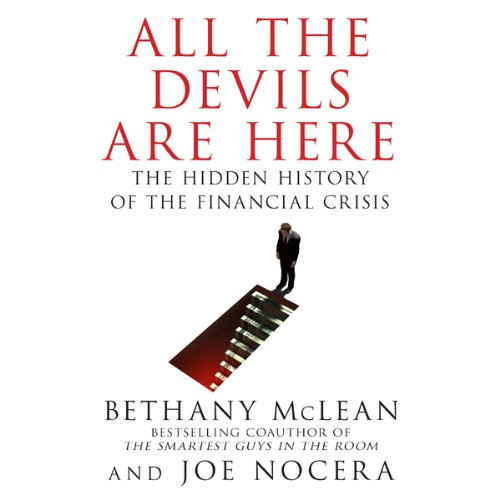All the Devils Are Here
By Bethany McLean and Joe Nocera
(Penguin, 2010, 400 pages)
 Economists will debate the causes of the global financial crisis for decades to come. There will never be any agreements as to the actual causes. In the meantime many books will be written, many conferences organised and future Oliver Stones will have many movie scripts to work with. Bethany McLean and Joe Nocera have provided a stable of characters, each of whom could be a future Gordon Gekko in their history of the crisis, All the Devils Are Here: The Hidden History of the Financial Crisis.
Economists will debate the causes of the global financial crisis for decades to come. There will never be any agreements as to the actual causes. In the meantime many books will be written, many conferences organised and future Oliver Stones will have many movie scripts to work with. Bethany McLean and Joe Nocera have provided a stable of characters, each of whom could be a future Gordon Gekko in their history of the crisis, All the Devils Are Here: The Hidden History of the Financial Crisis.
This book is full of detail, full of individuals making good and bad choices that all contributed to the global financial crisis. The quasi-government agencies Fannie Mae and Freddie Mac were, without doubt, out of control and market manipulators. McLean and Nocera tell a story of private sector players innovating to avoid dealing with the two agencies. In the meantime, too many people traded instruments whose risk-return characteristics they didn't really understand, while relying too much on the imprimatur of the ratings agencies.
Some have described this book as telling the story of smart people suddenly doing dumb things. To be sure, with the benefit of hindsight a lot of people did a lot of dumb things, yet that explanation is very unsatisfying. Given that a major financial crisis has occurred with many old and respected banks swept away, many millions suddenly unemployed and the global economy teetering on collapse, a tragi-comedy explanation is seriously incomplete.
Smart people doing dumb things is a necessary but not sufficient explanation for the crisis. Smart people do dumb things all the time, yet the global economy is normally quite sound. McLean and Nocera include a lot of detail in their book -- fascinating detail -- but ultimately it is bad history. To be clear, this book is well-written, well-researched and engrossing but it is bad history because ultimately it is just one damn thing after another. McLean and Nocera provide no narrative, just a wealth of information and facts.
Those facts -- damning facts -- do not go to the question of the causes of the crisis. In many respects we see people reacting to Fannie and Freddie, relying on ratings agencies, making dodgy loans and repackaging them, taking on risks they didn't understand, behaving very poorly.
The biggest problem with the book, however, is the lack of discussion about the impact of the Community Reinvestment Act. This goes to the heart of the issue. Bankers are notoriously risk-averse -- indeed several individuals in the book are described as being particularly risk averse -- yet American bankers went on a lending spree, where they deliberately lent money to people whom they knew couldn't pay back the loans. They then repackaged these loans into junk bonds, got ratings agency approval, and then sold them as triple A rated securities. Where was the common sense response to this nonsense?
Many US policy makers are still in denial over the Community Reinvestment Act (CRA). Peter Wallison, a member of the Financial Crisis Inquiry, issued a minority report which details the multiple failures of government policy, such as the CRA.
Hank Paulson gets off too lightly as well. It is certainly true the US was in recession in 2008, but there can be no doubt their actions in August and September 2008 contributed to the crisis. The US government nationalisation of Fannie and Freddie damaged investor confidence -- as McLean and Nocera point out. What they don't point out, however, is how Paulson further damaged confidence in September. He was talking down the economy and warning of another great depression and investors, who might have thought the government had access to superior information, responded accordingly. Of course, the government didn't have superior information, but the market responded nonetheless, and the collapse of Lehman Brothers intensified a recession into a far greater economic crisis.
Of all the books on the financial crisis, this is the most comprehensive and has been held up by some as the definitive account. While it is incomplete, it nonetheless is an important contribution to our understanding of the events of the past few years, adding a level of detail that few accounts to date have included.
No comments:
Post a Comment